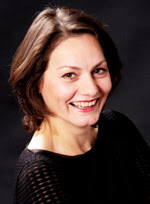Anna Maria Pammer, National Gallery
After performing a program of Lieder by composers of the Second Viennese School at the Austrian Embassy's An das Lied Festival on Wednesday, soprano Anna Maria Pammer and pianist Markus Vorzellner reprised the concert Sunday evening on the free concert series at the National Gallery of Art. A modest audience filled the small lecture hall on the West Building ground floor, which provided a more intimate venue than the regular West Garden Court. The ingenious program brought together rarely heard songs by the Viennese triumvirate of Arnold Schoenberg, Alban Berg, and Anton Webern.
 Anna Maria Pammer, soprano |
All but the first group of songs set poems by Stefan George (1868-1933), a poet who might be described as a German symbolist who reconciled German modernism with classical poetry. He translated Dante, Shakespeare, and Baudelaire into German. Webern's much more pointillistic settings of George's poems, especially the Vier Lieder nach Stefan George, captured the disturbing, erotic tone -- just with George's ambiguous, homoerotic aesthetic shifted into a female voice. While Webern shows his characteristic economy in these songs from around 1908, Schoenberg's setting of the fifteen songs of Das Buch der hängenden Gärten, op. 15, is more intense and emotionally direct. The climax of the cycle was the paean to pure lust, Wenn ich heut nicht deinen Leib berühre (If I do not touch your body today), with its agitated piano accompaniment incarnating the narrator's feverish passion. The final song was wreathed by a gorgeous prelude in piano and a long, somber postlude.
The free concert series at the National Gallery of Art continues this week with a Wednesday recital by pianist Tao Lin (May 9, 12:10 pm) in the East Building Auditorium and a Sunday concert by the National Gallery Chamber Players String Quartet and pianist Miceal O'Rourke (May 13, 6:30 pm).





















































No comments:
Post a Comment